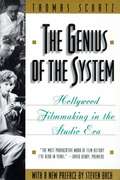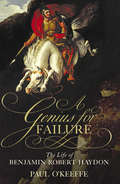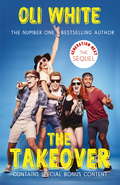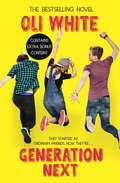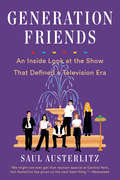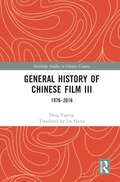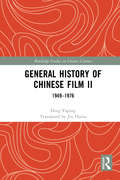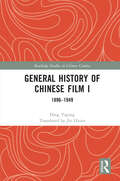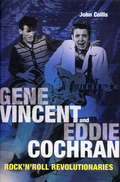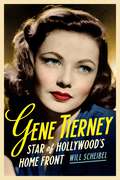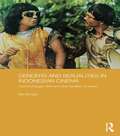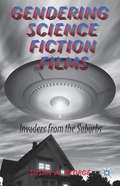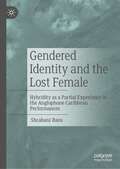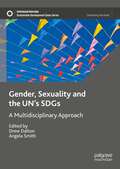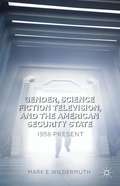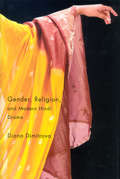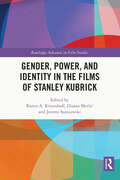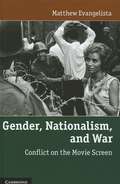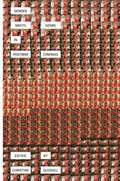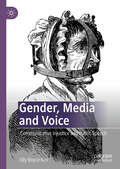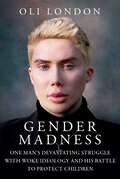- Table View
- List View
The Genius of the System
by Thomas SchatzAt a time when the studio is making a stunning comeback, film historian Thomas Schatz provides an indispensable account of Hollywood's tradional blend of business and art. This book lays to rest the persistent myth that businesspeople and producers stifle artistic talent and reveals instead the genius of a system of collaboration and conflict. Working from industry documents, Schatz traces the development of house styles, the rise and fall of careers, and the making-and unmaking-of movies, from Frankenstein to Spellbound to Grand Hotel. Richly illustrated and highly readable, The Genius of the System gives the definitive view of the workings of the Old Hollywood and the foundations of the New.
A Genius for Failure: The Life of Benjamin Robert Haydon
by Paul O'Keeffe* Haydon's first attempt at suicide ended when the low calibre bullet fired from his pistol fractured his skull but failed to penetrate his brain. * His second attempt also failed: a deep slash across his throat left a large pool of blood at the entrance to his studio, but he was still able to reach his easel on the opposite side of the room. *Only his third attempt, another cut to the throat which sprayed blood across his unfinished canvas, was successful. He died face-down before the bespattered 'Alfred and the First British Jury', his final bid 'to improve the taste of the English people' through the High Art of historical painting.* Such intensity, struggle and near-comic inability to succeed encapsulate Haydon's career. Thirty years before his death his huge, iconic paintings had made him the toast of early 19th-century London, drawing paying crowds to the Egyptian Hall in Piccadilly for months and leading to nationwide tours. * However, his attempt to repeat such success three months before his death was to destroy him: barely a soul turned up, leaving the desperate painter alone, humiliated, and facing financial ruin. * In A Genius for Failure Paul O'Keeffe makes clear that the real tragedy of Haydon lay in the extent to which his failures were unwittingly engineered by his own actions - his refusal to resort to the painting of fashionable portraits, for example, and his self-destructively acrimonious relationship with the RA.* The company he kept - Keats, Shelley, Wordsworth, Sir Robert Peel and the Duke of Wellington, among many others - and the momentous events he lived through - The Battle of Waterloo, the Coronation of George IV, and the passing of the first Parliamentary Reform Bill - make A Genius for Failure not only the definitive biography of this fascinating and tragic painter, but a stirring portrayal of an age.
Generations of Jewish Directors and the Struggle for America’s Soul: Wyler, Lumet, and Spielberg (Renewing the American Narrative)
by Sam B. GirgusFrom generation to generation, three outstanding American Jewish directors—William Wyler, Sidney Lumet, and Steven Spielberg--advance a tradition of Jewish writers, artists, and leaders who propagate the ethical basis of the American Idea and Creed. They strive to renew the American spirit by insisting that America must live up to its values and ideals. These directors accentuate the ethical responsibility for the other as a basis of the American soul and a source for strengthening American liberal democracy. In the manner of the jeremiad, their films challenge America to achieve a liberal democratic culture for all people by becoming more inclusive and by modernizing the American Idea. Following an introduction that relates aspects of modern ethical thought to the search for America’s soul, the book divides into three sections. The Wyler section focuses on the director’s social vision of a changing America. The Lumet section views his films as dramatizing Lumet’s dynamic and aggressive social and ethical conscience. The Spielberg section tracks his films as a movement toward American redemption and renewal that aspires to realize Lincoln’s vision of America as the hope of the world. The directors, among many others, perpetuate a “New Covenant” that advocates change and renewal in the American experience.
Generation Next: The Takeover
by Oli White** THE #1 BESTSELLER!**The thrilling sequel to YouTube sensation Oli White's smash-hit debut GENERATION NEXT. *Contains exclusive bonus content, including a Q&A with Oli!*School has finished for good, and Jack and his friends - Ella, Austin, Ava and Sai - are giving their online social media platform, Generation Next, the ultimate relaunch: a stage takeover at the world's biggest music festival. When you're interviewing famous stars and streaming the footage all over the globe, what could possibly go wrong? The takeover is the gang's most epic task yet, and when they meet TV producer Ethan, he seems like the perfect person to help out. Everyone loves Ethan: he's smart, talented and a natural addition to the group. But Jack isn't so sure. Ethan seems to be hiding something... and why can't the rest of GenNext see it? If Jack isn't careful, his dreams for Generation Next - and his relationships with Ella and his closest friends - could be about to go up in smoke...
Generation Next: The Takeover
by Oli WhiteThe sequel to YouTube sensation Oli White's bestselling debut GENERATION NEXT. School has finished for good, and Jack and his friends - Ella, Austin, Ava and Sai - are giving their online social media platform, Generation Next, the ultimate relaunch: a stage takeover at the world's biggest musical festival. When you're interviewing famous stars and streaming the footage all over the globe, what could possibly go wrong? The takeover is the gang's most epic task yet, and when they meet TV producer Ethan, he seems like the perfect person to help out. Everyone loves Ethan: he's smart, talented and a natural addition to the group. But Jack isn't so sure. Ethan seems to be hiding something... and why can't the rest of GenNext see it? If Jack isn't careful, his dreams for Generation Next - and his relationships with his closest friends - are about to go up in smoke...(P) 2017 Hodder & Stoughton
Generation Next
by Oli White**The bestselling debut novel from YouTube sensation Oli White. CONTAINS EXCLUSIVE BONUS CONTENT!**Things haven't been easy for Jack recently - life as a teenager has its ups and downs. But when he meets a new group of friends, who are every bit as geek as they are chic, his luck seems to be changing. Each of the group is talented and when they pool together to create Generation Next, an incredible new kind of social media platform, it's clear that they're on to something special.What if your Instagram account grew by hundreds of thousands of followers overnight, and big companies were fighting each other to offer you photoshoots? When GenNext suddenly goes viral, Jack and his friends are thrust into a crazy world of fame which is as terrifying as it is awesome. Because someone out there is determined to trip Jack up at every step. If he doesn't stop them, soon everyone he cares about - his friends, his family, and the girl he's falling for - will be in danger...
Generation Next
by Oli WhiteThe stunning debut novel from YouTube sensation Oli White. Includes an exclusive audiobook introduction read by Oli White.Things haven't been easy for Jack recently - life as a teenager has its ups and downs. But when he meets a new group of friends, who are every bit as geek as they are chic, his luck seems to be changing. Each of the group is talented and when they pool together to create Generation Next, an incredible new kind of social media platform, it's clear that they're on to something special. What if your Instagram account grew by hundreds of thousands of followers overnight, and big companies were fighting each other to offer you photoshoots? When GenNext suddenly goes viral, Jack and his friends are thrust into a crazy world of fame which is as terrifying as it is awesome. Because someone out there is determined to trip Jack up at every step. If he doesn't stop them, soon everyone he cares about - his friends, his family, and the girl he's falling for - will be in danger...(P)2016 Hodder & Stoughton
Generation Friends: An Inside Look at the Show That Defined a Television Era
by Saul AusterlitzA fascinating behind-the-scenes look at Friends, published for the twenty-fifth anniversary of the show's premiere. Howyoudoin’? In September 1994, six friends sat down in their favorite coffee shop and began bantering about sex, relationships, jobs, and just about everything else. A quarter of a century later, new fans are still finding their way into the lives of Rachel, Ross, Joey, Chandler, Monica, and Phoebe, and thanks to the show’s immensely talented creators, its intimate understanding of its youthful audience, and its reign during network television’s last moment of dominance, Friends has become the most influential and beloved show of its era. Friends has never gone on a break, and this is the story of how it all happened. Noted pop culture historian Saul Austerlitz utilizes exclusive interviews with creators David Crane and Marta Kauffman, executive producer Kevin Bright, director James Burrows, and many other producers, writers, and cast members to tell the story of Friends’ creation, its remarkable decade-long run, and its astonishing Netflix-fueled afterlife. Readers will go behind the scenes to hear from the people who were present as the show was developed and cast, written and filmed. There will be talk of trivia contests, prom videos, trips to London, Super Bowls, lesbian weddings, wildly popular hairstyles, superstar cameos, mad dashes to the airport, and million-dollar contracts. They’ll also discover surprising details—that Monica and Joey were the show’s original romantic couple, how Danielle Steel probably saved Jennifer Aniston’s career, and why Friends is still so popular that if it was a new show, its over-the-air broadcast reruns would be the ninth-highest-rated program on TV. The show that defined the 1990s has a legacy that has endured beyond wildest expectations. And in this hilarious, informative, and entertaining book, readers will now understand why.
General History of Chinese Film III: 1976–2016 (Routledge Studies in Chinese Cinema)
by Ding YapingThe Reform and Opening-up of China since the late 1970s has not only transformed the economic and political situation of the country, but also transformed the Chinese film industry. This volume focuses on the 40 years of the history of Chinese film in the post-Mao era. As all aspects of film production, distribution and exhibition have been commercialized, Chinese film has become an industry of immense scale and has grown by leaps and bounds. Meanwhile, contemporary Chinese film is marked by a new zeitgeist, with Chinese film closely integrated with Chinese society and the economy. The author argues that the Chinese film industry clearly stands at a turning point where the future of Chinese film and the way to further awaken, change, and shape film production have become important issues worth consideration in contemporary film history. The book will be essential reading for scholars and students in film studies, Chinese studies, cultural studies and media studies, helping readers develop a comprehensive understanding of Chinese film.
General History of Chinese Film II: 1949-1976 (Routledge Studies in Chinese Cinema)
by Ding YapingSince 1949, Chinese film has been greatly influenced by a variety of historical, cultural, and political events in the history of the People’s Republic of China. This volume explores the development of Chinese film from 1949 to 1976. This volume restores Chinese film to its original historical form and assesses its complex relationship with society, politics, culture, and art in the Maoist period. The 17-year films, Cultural Revolution-era films, the influence of model operas, and the documentary newsreels of Xinwen Jianbao are discussed. Combining a macro-perspective with a micro-perspective, the author analyzes the special characteristics of Chinese film in this period and showcases the inheritance and differences between earlier Chinese film and Chinese film in the newly founded the People’s Republic of China. The book will be essential reading for scholars and students in film studies, Chinese studies, cultural studies, and media studies, helping readers develop a comprehensive understanding of Chinese film.
General History of Chinese Film I: 1896–1949 (Routledge Studies in Chinese Cinema)
by Ding YapingThe early years of the history of Chinese film have lately been the subject of resurgent interest and a growing body of scholarship has come to recognise and identify an extraordinarily diverse and complex period. This volume explores the development of Chinese film from 1896 to 1949. The volume covers the screening of foreign films in Shanghai, Hong Kong and other coastal cities in China, the technological and industrial development of Chinese national cinema, key filmmakers and actors of early Chinese cinema, changing modes of representation and narration, as well as the social and cultural contexts within which early Chinese films were produced and circulated. The relationship between the War of Resistance against Japan and the Chinese civil war and Chinese film is also explored. The book will be essential reading for scholars and students in film studies, Chinese studies, cultural studies and media studies, helping readers develop a comprehensive understanding of Chinese film.
Gene Vincent & Eddie Cochran
by John CollisThe United Kingdom had never seen anything like it, as two rock'n'roll legends rampaged around the country on Britain's first-ever rock tour. Gene Vincent and Eddie Cochran lived the rock'n'roll lifestyle to the full, bringing to an end the monochrome 1950s and ushering in the swinging 60s.John Collis has traced the story of the UK tour that was a defining moment in British popular culture to its tragic climax with the death of Eddie Cochran. He looks back on the contrasting backgrounds of the two stars, follows the tale onwards to Gene Vincent's death from alcohol and drug abuse, and examines the lasting legacy of their music.
Gene Tierney: Star of Hollywood's Home Front (Contemporary Approaches to Film and Media Series)
by Will ScheibelGene Tierney may be one of the most recognizable faces of studio-era Hollywood: she starred in numerous classics, including Leave Her to Heaven, The Ghost and Mrs. Muir, and Laura, with the latter featuring her most iconic role. While Tierney was considered one of the most beautiful women in Hollywood, she personified "ordinariness" both on- and off-screen. Tierney portrayed roles such as a pinup type, a wartime worker, a wife, a mother, and, finally, a psychiatric patient—the last of which may have hit close to home for her, as she would soon leave Hollywood to pursue treatment for mental illness and later attempted suicide in the 1950s. After her release from psychiatric clinics, Tierney sought a comeback as one of the first stars whose treatment for mental illness became public knowledge. In this book, Will Scheibel not only examines her promotion, publicity, and reception as a star but also offers an alternative history of the United States wartime efforts demonstrated through the arc of Tierney’s career as a star working on the home front. Scheibel’s analysis aims to showcase that Tierney was more than just "the most beautiful woman in movie history," as stated by the head of production at Twentieth Century Fox in the 1940s and 1950s. He does this through an examination of her making, unmaking, and remaking at Twentieth Century Fox, rediscovering what she means as a movie legend both in past and up to the present. Film studies scholars, film students, and those interested in Hollywood history and the legacy of Gene Tierney will be delighted by this read.
Genders and Sexualities in Indonesian Cinema: Constructing gay, lesbi and waria identities on screen (Media, Culture and Social Change in Asia)
by Ben MurtaghIndonesia has a long and rich tradition of homosexual and transgender cultures, and the past 40 years in particular has seen an increased visibility of sexual minorities in the country, which has been reflected through film and popular culture. This book examines how representations of gay, lesbian and transgender individuals and communities have developed in Indonesian cinema during this period. The book first explores Indonesian engagement with waria (male-to-female transgender) identities and the emerging representation of gay and lesbi Indonesians during Suharto’s New Order regime (1966-98), before going on to the reimagining of these positions following the fall of the New Order, a period which saw the rebirth of the film industry with a new generation of directors, producers and actors. Using original interview research and focus groups with gay, lesbi and waria identified Indonesians, alongside the films themselves and a wealth of archival sources, the book contrasts the ways in which transgendered lives are actually lived with their representations on screen.
Gendering Science Fiction Films
by Susan A. GeorgeIn the 1950s, science fiction (SF) invasion films played a complicated part in both supporting and criticizing Cold War ideologies. George examines what these films reveal about the tensions in the United States at the dawn of the atomic age especially concerning gender roles and expectations. Using a cultural studies approach, she works from the assumption that "invasion" films with their "us" versus "them" nature provide important visual and verbal narratives for American citizens' trying to understand and negotiate the social and political changes that followed the allied victory in World War II. By reading these invasion narratives as performances of middle-class, primarily white Americans' excitement and anxieties about social and political issues, George shows how they often played out as another round in the battle of the sexes. This book examines the way representation in these films tap into anxieties concerning the feminine and alien other.
Gendered Identity and the Lost Female: Hybridity as a Partial Experience in the Anglophone Caribbean Performances
by Shrabani BasuThis book offers an exploration of the postcolonial hybrid experience in anglophone Caribbean plays and performance from a feminist perspective.In a hitherto unattempted consideration of Caribbean theatre and performance, this study of gendered identities chronicles the postcolonial hybrid experience – and how it varies in the context of questions of sex, performance and social designation. In the process, it examines the diverse performances of the anglophone Caribbean. The work includes works by Caribbean anglophone playwrights like Derek Walcott, Mustapha Matura, Michael Gikes, Dennis Scott, Trevor Rhone, Earl Lovelace and Errol John with more recent works of Pat Cumper, Rawle Gibbons and Tony Hall. The study would also engage with Carnival, calypso and chutney music, while commenting on its evolving influences over the hybrid imagination.Each section covers the dominant socio-political thematics associated with the tradition and its effect on it, followed by an analysis of contemporaneously significant literary and cultural works – plays, carnival narrative and calypso and chutney lyrics as well as the experiences of performers. From Lovelace’s fictional Jestina to the real-life Drupatee, the book critically explores the marginalization of female performances while forming a hybrid identity.
Gender, Sexuality and the UN's SDGs: A Multidisciplinary Approach (Sustainable Development Goals Series)
by Drew Dalton Angela SmithAgainst the backdrop of Covid-19, this edited volume will utilize a gendered lens to explore the United Nation’s Sustainable Development Goals (SDGs), with a clear focus on challenging the omission of sexuality in relation to the SDGs as well as analyzing the ways in which the SDGs are also equally relevant for Western countries. While acknowledging the importance of these goals, contributors unpack the exclusion of marginalized genders and sexualities as well as how popular media and social media contribute to the wider understanding of issues of gender and sexuality and the SDGs. This volume also dispels assumptions about the irrelevance of SDGs to countries in the West, with a particular focus on the UK. Chapters examine a variety of topics including: HIV/AIDS, sex work, global migration, climate change and environmental sustainability, poverty, education, and sexual harassment. This collection will be of interest to scholars, researchers, and students across Sociology, Gender & Sexuality Studies, Education, Development Studies and Sustainability Studies.
Gender, Science Fiction Television, And The American Security State
by Mark E. WildermuthAs American security became increasingly dependent on technology to shape the consciousness of its populace and to defend them, science fiction shows like The Twilight Zone, Star Trek, and The X-Files both promoted the regime's gendered logic and raised significant questions about that logic and its gendered roles.
Gender, Religion, and Modern Hindi Drama
by Diana DimitrovaDiana Dimitrova studies the representation of gender and religion in Hindi drama from its beginnings in the second half of the nineteenth century until the 1960s - the period when urban proscenium Hindi theatre, which originated under Western influence, matured and thrived. Her focus is on how different religious and mythological models pertaining to women have been reworked in Hindi drama and whether the seven representative dramatists discussed in this book present conservative or liberating Hindu images of the feminine. She examines how the intersections of gender, religion, and ideology account for the creation of the canon of modern Hindi drama, specifically the assertion of a conservative interpretation of orthodox Hindu images of the feminine as well as the exclusion of dramatists who introduce innovative liberating images of the feminine. The overt reason for the negative attitude toward this innovative representation of gender is that it is perceived as "Western" and thus "non-Indian." By contrast, the author's analysis of Hindu mythology, religion, and theatre history reveals that the new interpretation of gender is deeply embedded in Hindu tradition and is thus both Hindu Indian and modernist Western in character.
Gender, Religion, and Modern Hindi Drama
by Diana DimitrovaDiana Dimitrova studies the representation of gender and religion in Hindi drama from its beginnings in the second half of the nineteenth century until the 1960s - the period when urban proscenium Hindi theatre, which originated under Western influence, matured and thrived. Her focus is on how different religious and mythological models pertaining to women have been reworked in Hindi drama and whether the seven representative dramatists discussed in this book present conservative or liberating Hindu images of the feminine. She examines how the intersections of gender, religion, and ideology account for the creation of the canon of modern Hindi drama, specifically the assertion of a conservative interpretation of orthodox Hindu images of the feminine as well as the exclusion of dramatists who introduce innovative liberating images of the feminine. The overt reason for the negative attitude toward this innovative representation of gender is that it is perceived as "Western" and thus "non-Indian." By contrast, the author's analysis of Hindu mythology, religion, and theatre history reveals that the new interpretation of gender is deeply embedded in Hindu tradition and is thus both Hindu Indian and modernist Western in character.
Gender, Power, and Identity in The Films of Stanley Kubrick (Routledge Advances in Film Studies)
by Karen A. Ritzenhoff Dijana Metlić Jeremi SzaniawskiThis volume features a set of thought-provoking and long overdue approaches to situating Stanley Kubrick’s films in contemporary debates around gender, race, and age – with a focus on women’s representations. Offering new historical and critical perspectives on Kubrick’s cinema, the book asks how his work should be viewed bearing in mind issues of gender equality, sexual harassment, and abuse. The authors tackle issues such as Kubrick’s at times questionable relationships with his actresses and former wives, the dynamics of power, misogyny and miscegenation in his films, and auteur ‘apologism’, among others. The selection delineates these complex contours of Kubrick’s work by drawing on archival sources, engaging in close readings of specific films, and exploring Kubrick through unorthodox venture points. With an interdisciplinary scope and social justice-centered focus, this book offers new perspectives on a well-established area of study. It will appeal to scholars and upper-level students of film studies, media studies, gender studies, and visual culture, as well as to fans of the director interested in revisiting his work with a new perspective.
Gender, Nationalism, and War
by Matthew EvangelistaVirginia Woolf famously wrote 'as a woman I have no country', suggesting that women had little stake in defending countries where they are considered second-class citizens, and should instead be forces for peace. Yet women have been perpetrators as well as victims of violence in nationalist conflicts. This unique book generates insights into the role of gender in nationalist violence by examining feature films from a range of conflict zones. In The Battle of Algiers, female bombers destroy civilians while men dress in women's clothes to prevent the French army from capturing and torturing them. Prisoner of the Mountains shows a Chechen girl falling in love with her Russian captive as his mother tries to rescue him. Providing historical and political context to these and other films, Matthew Evangelista identifies the key role that economic decline plays in threatening masculine identity and provoking the misogynistic violence that often accompanies nationalist wars.
Gender Meets Genre in Postwar Cinemas
by Christine GledhillThis remarkable collection uses genre as a fresh way to analyze the issues of gender representation in film theory, film production, spectatorship, and the contexts of reception. With a uniquely global perspective, these essays examine the intersection of gender and genre in not only Hollywood films but also in independent, European, Indian, and Hong Kong cinemas. Working in the area of postcolonial cinema, contributors raise issues dealing with indigenous and global cinemas and argue that contemporary genres have shifted considerably as both notions of gender and forms of genre have changed. The volume addresses topics such as the history of feminist approaches to the study of genre in film, issues of female agency in postmodernity, changes taking place in supposedly male-dominated genres, concepts of genre and its use of gender in global cinema, and the relationship between gender and sexuality in film. Contributors are Ira Bhaskar, Steven Cohan, Luke Collins, Pam Cook, Lucy Fischer, Jane Gaines, Christine Gledhill, Derek Kane-Meddock, E. Ann Kaplan, Samiha Matin, Katie Model, E. Deidre Pribram, Vicente Rodriguez Ortega, Adam Segal, Chris Straayer, Yvonne Tasker, Deborah Thomas, and Xiangyang Chen.
Gender, Media and Voice: Communicative Injustice and Public Speech
by Jilly Boyce KayThis book explores the increasing imperatives to speak up, to speak out, and to ‘find one’s voice’ in contemporary media culture. It considers how, for women in particular, this seems to constitute a radical break with the historical idealization of silence and demureness. However, the author argues that there is a growing and pernicious gap between the seductive promise of voice, and voice as it actually exists. While brutal instruments such as the ducking stool and scold’s bridle are no longer in use to punish women’s speech, Kay proposes that communicative injustice now operates in much more insidious ways. The wide-ranging chapters explore the mediated ‘voices’ of women such as Monica Lewinsky, Hannah Gadsby, Diane Abbott, and Yassmin Abdel-Magied, as well as the problems and possibilities of gossip, nagging, and the ‘traumatised voice’ in television talk shows. It critiques the optimistic claims about the ‘unleashing’ of women’s voices post-#MeToo and examines the ways that women’s speech continues to be trivialized and devalued. Communicative justice, the author argues, is not about empowering individuals to ‘find their voice’, but about collectively transforming the whole communicative terrain.
Gender Madness: One Man's Devastating Struggle with Woke Ideology and His Battle to Protect Children
by Oli LondonHow one man's struggles with self-Identity and detransition lays challenge to the very foundation of the "gender ideology" movement. While documenting his own personal identity struggles with gender and self-identity, British K-Pop singer Oli London explores the root cause of the issue of trans ideology and gender identity, tackling the pressures of social media, the education system, media, and other factors that are pushing a growing number of young people into transitioning. He takes a close look at real world examples and examines laws, research, and data to help lift the lid on the multibillion-dollar gender affirming care industry.Gender Madness gives an intimate look into what led Oli London to want to become a "Korean woman" and how he overcame his battle to become an advocate for the millions of young people who question their own identity. He recently publicly announced he had detransitioned and is living as a male again and has since become an outspoken activist for children and women's rights, appearing regularly on numerous news networks including Fox News, Newsmax, OAN, EWTN, Piers Morgan Uncensored, Tucker Carlson Tonight, and Talk TV to campaign against gender affirming surgery in teenagers. This book shares his deeply personal life journey and his important message to others, all while encouraging readers to question the current societal trends and challenge their own way of thinking.
